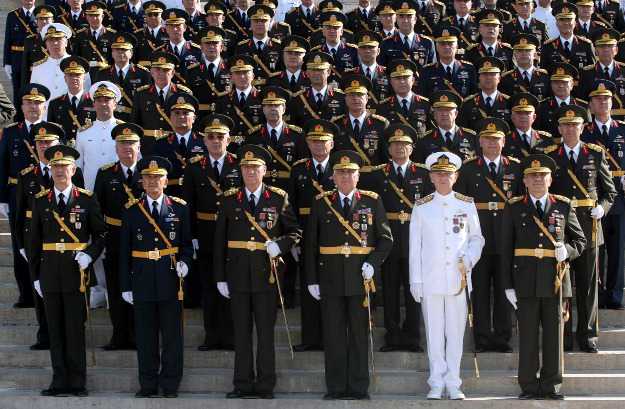Can Egypt’s powerful, secular military take a page from Ankara and learn to get along with the country’s new Islamic parties?
BY TOM HUNDLEY | DECEMBER 14, 2011

In this year of upheaval in the Middle East, a barely mentioned story may mark one of the most important developments in the region.
In July, the Turkish army’s top four generals resigned in what critics say was a misbegotten attempt to trigger a national crisis. The generals, led by Chief of Staff Isik Kosaner, seemed to be hoping that their dramatic departure would topple the country’s moderate Islamist government and restore the military’s primacy in Turkish politics.
The story is what didn’t happen next. The generals’ resignation briefly roiled the waters of Turkish politics, but failed to overturn the civilian government. Prime Minister Recep Tayyip Erdogan quickly reasserted control over the military brass, replacing Kosaner with a general of his own choosing. He then convened a meeting of the Senior Military Council, a high-level assembly usually co-chaired by the prime minister and the chief of staff. This time, however, Erdogan sat alone at the head of the table — sending a clear signal that the civilians were now in charge.
The generals took a reckless gamble with the country’s stability, but fortunately for the Middle East’s largest and most successful democracy, they lost their bet. Instead of the expected crisis, the Turkish nation quietly bid farewell to 88 years of Kemalism — the founding ideal that put Turkey on the path of modernization and secularism — and the notion that the generals always know best.
While vivid scenes of the Arab Spring were becoming YouTube staples across the world, Turkey’s ability to overcome this crisis in civil-military relations carries important implications for the entire region. The parallels are striking and the lessons instructive for Egypt, in particular, especially after the Muslim Brotherhood’s victory in the first round of Egypt’s parliamentary elections.
Both Egypt and Turkey have long histories of domination by their military establishments, which in both cases have been the benefactors of generous U.S. support. Since the founding of the modern Turkish republic in 1923, the army has staged four coups, and up until 1989 all but one of Turkey’s presidents had come from a military background. In Egypt, the military has been in continuous control since 1952, when Gamal Abdel Nasser led a coup against the monarchy.
When the crowds in Cairo’s Tahrir Square demanded the ouster of Hosni Mubarak, himself a former Air Force commander, it was the senior Egyptian military command that told him it was time to go — and then quietly seized power for itself. The so-called Supreme Council of the Armed Forces, headed by Field Marshal Mohamed Hussein Tantawi, promised to step aside once a new civilian leadership had established itself, but now seems intent on retaining the privileges it enjoyed during the Mubarak era.
For Turkey, loosening the generals’ grip has been a long and fraught process. The civilians only began to gain an upper hand with the rise of Erdogan’s Justice and Development Party (AKP) — an offshoot of a banned, avowedly Islamist party that was nevertheless committed to bringing Turkey into the 21st century. The AKP quickly proved successful at maintaining its pious roots while also being democratic, open to the West, and — as it would turn out — surprisingly good at running the economy.
via What Turkey Can Teach Egypt – By Tom Hundley | Foreign Policy.

Leave a Reply